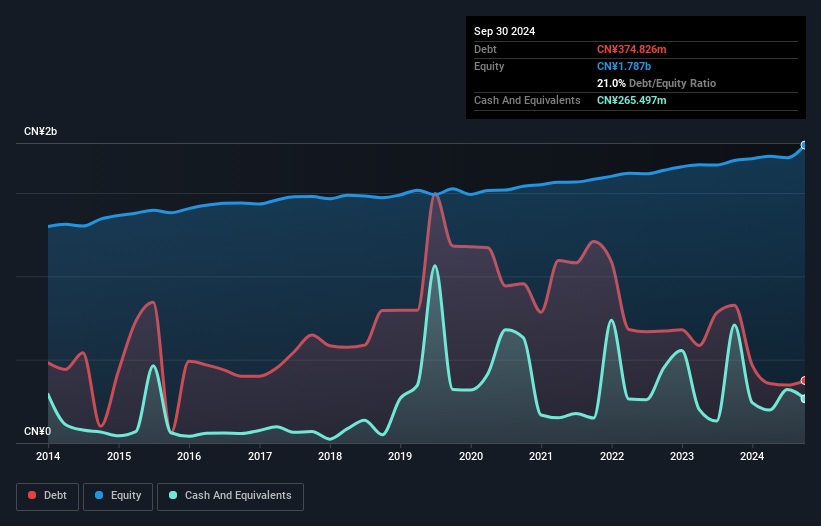
Howard Marks put it nicely when he said that, rather than worrying about share price volatility, 'The possibility of permanent loss is the risk I worry about... and every practical investor I know worries about.' So it might be obvious that you need to consider debt, when you think about how risky any given stock is, because too much debt can sink a company. We can see that Shanghai Shentong Metro Co.,Ltd. (SHSE:600834) does use debt in its business. But is this debt a concern to shareholders?
When Is Debt A Problem?
Debt is a tool to help businesses grow, but if a business is incapable of paying off its lenders, then it exists at their mercy. Ultimately, if the company can't fulfill its legal obligations to repay debt, shareholders could walk away with nothing. However, a more frequent (but still costly) occurrence is where a company must issue shares at bargain-basement prices, permanently diluting shareholders, just to shore up its balance sheet. Of course, debt can be an important tool in businesses, particularly capital heavy businesses. When we examine debt levels, we first consider both cash and debt levels, together.
View our latest analysis for Shanghai Shentong MetroLtd
What Is Shanghai Shentong MetroLtd's Net Debt?
The image below, which you can click on for greater detail, shows that Shanghai Shentong MetroLtd had debt of CN¥374.8m at the end of September 2024, a reduction from CN¥826.7m over a year. However, it does have CN¥265.5m in cash offsetting this, leading to net debt of about CN¥109.3m.

How Strong Is Shanghai Shentong MetroLtd's Balance Sheet?
According to the last reported balance sheet, Shanghai Shentong MetroLtd had liabilities of CN¥585.0m due within 12 months, and liabilities of CN¥151.4m due beyond 12 months. On the other hand, it had cash of CN¥265.5m and CN¥177.5m worth of receivables due within a year. So its liabilities outweigh the sum of its cash and (near-term) receivables by CN¥293.3m.
Of course, Shanghai Shentong MetroLtd has a market capitalization of CN¥3.94b, so these liabilities are probably manageable. But there are sufficient liabilities that we would certainly recommend shareholders continue to monitor the balance sheet, going forward.
We use two main ratios to inform us about debt levels relative to earnings. The first is net debt divided by earnings before interest, tax, depreciation, and amortization (EBITDA), while the second is how many times its earnings before interest and tax (EBIT) covers its interest expense (or its interest cover, for short). Thus we consider debt relative to earnings both with and without depreciation and amortization expenses.
Shanghai Shentong MetroLtd has a low net debt to EBITDA ratio of only 1.2. And its EBIT easily covers its interest expense, being 16.1 times the size. So we're pretty relaxed about its super-conservative use of debt. But the other side of the story is that Shanghai Shentong MetroLtd saw its EBIT decline by 3.2% over the last year. That sort of decline, if sustained, will obviously make debt harder to handle. The balance sheet is clearly the area to focus on when you are analysing debt. But you can't view debt in total isolation; since Shanghai Shentong MetroLtd will need earnings to service that debt. So if you're keen to discover more about its earnings, it might be worth checking out this graph of its long term earnings trend.
But our final consideration is also important, because a company cannot pay debt with paper profits; it needs cold hard cash. So the logical step is to look at the proportion of that EBIT that is matched by actual free cash flow. Happily for any shareholders, Shanghai Shentong MetroLtd actually produced more free cash flow than EBIT over the last three years. That sort of strong cash generation warms our hearts like a puppy in a bumblebee suit.
Our View
Happily, Shanghai Shentong MetroLtd's impressive interest cover implies it has the upper hand on its debt. But truth be told we feel its EBIT growth rate does undermine this impression a bit. Zooming out, Shanghai Shentong MetroLtd seems to use debt quite reasonably; and that gets the nod from us. While debt does bring risk, when used wisely it can also bring a higher return on equity. There's no doubt that we learn most about debt from the balance sheet. But ultimately, every company can contain risks that exist outside of the balance sheet. We've identified 1 warning sign with Shanghai Shentong MetroLtd , and understanding them should be part of your investment process.
When all is said and done, sometimes its easier to focus on companies that don't even need debt. Readers can access a list of growth stocks with zero net debt 100% free, right now.
New: Manage All Your Stock Portfolios in One Place
We've created the ultimate portfolio companion for stock investors, and it's free.
• Connect an unlimited number of Portfolios and see your total in one currency
• Be alerted to new Warning Signs or Risks via email or mobile
• Track the Fair Value of your stocks
Have feedback on this article? Concerned about the content? Get in touch with us directly. Alternatively, email editorial-team (at) simplywallst.com.
This article by Simply Wall St is general in nature. We provide commentary based on historical data and analyst forecasts only using an unbiased methodology and our articles are not intended to be financial advice. It does not constitute a recommendation to buy or sell any stock, and does not take account of your objectives, or your financial situation. We aim to bring you long-term focused analysis driven by fundamental data. Note that our analysis may not factor in the latest price-sensitive company announcements or qualitative material. Simply Wall St has no position in any stocks mentioned.
About SHSE:600834
Shanghai Shentong MetroLtd
Engages in the public transportation operation and maintenance management businesses in China.
Flawless balance sheet and slightly overvalued.
Market Insights
Community Narratives


